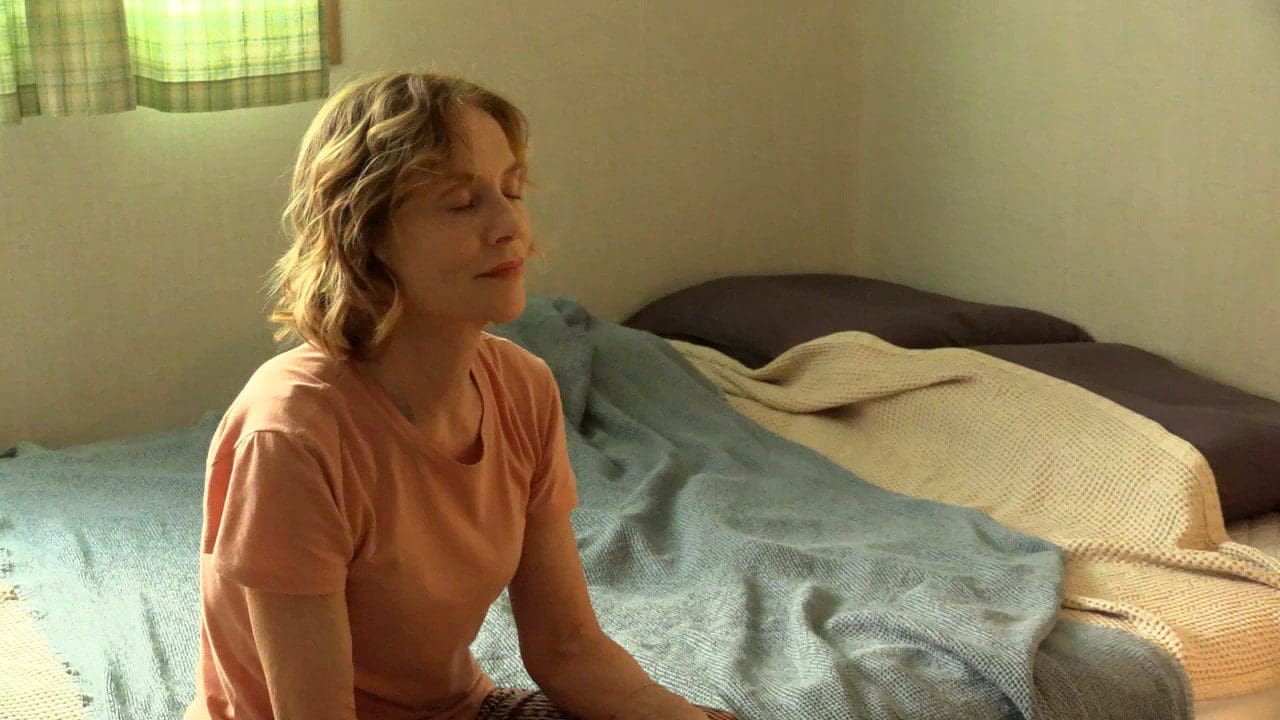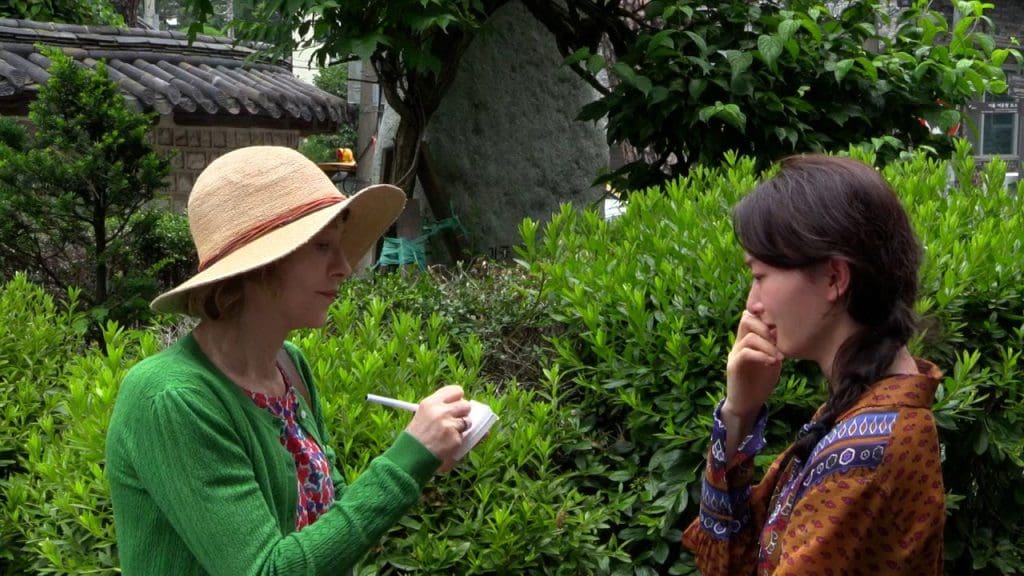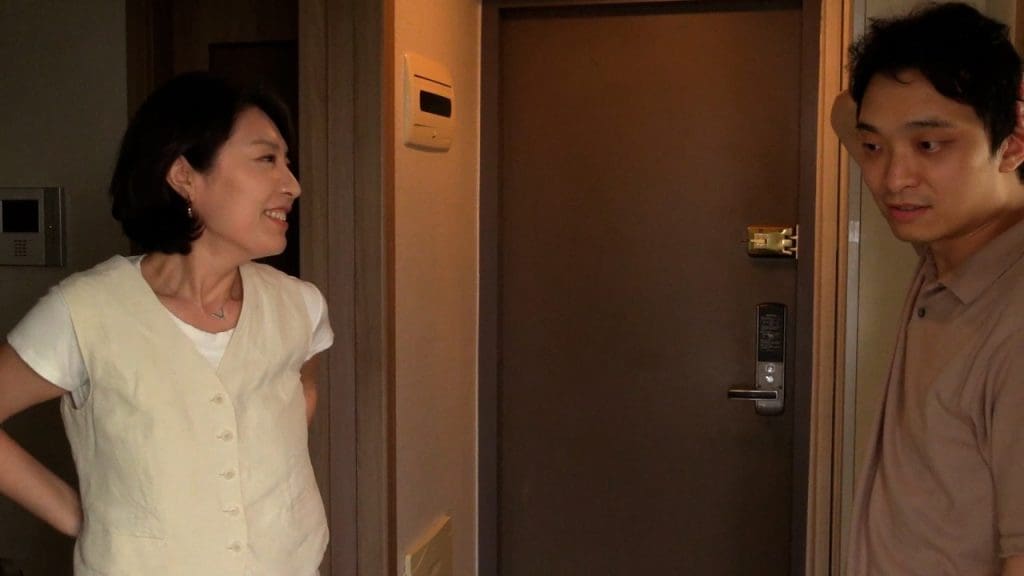
‘Nobody knows where the woman comes from. She is sitting on a park bench and diligently playing a child’s recorder,’ reads the Berlinale’s web copy for Hong Sang Soo’s A Traveller’s Needs. This is the Hong method—an ungraspable narrative that makes any logical linearity appear redundant. His films are not ‘about’ something, rather they rotate through repetitive moments of daily life that build up to striking interior dramas.
In A Traveller’s Needs, Isabelle Huppert plays Iris, a French woman living in Seoul as a French tutor with peculiar teaching methods and an addiction to makgeoli, a milky rice wine. Her pedagogical method involves carrying a stack of index cards, which she pulls out only to translate her clients’ speech when she feels that an emotional truth has been expressed— their admittances of self-doubt, of their annoyance, or their grief. The film is mostly in English—already an act of translation between her Korean students and her French native tongue—which makes this double act of translation even more striking. Iris performs the translations with a stylised exaggeration and gentle poesis. Iris says that a true grasp on a foreign language is made only through one’s ability to express something with emotional meaning. “One day you may wake up and your heart has assimilated this foreign language,” she tells her students.
You may also like: Berlinale 2024: Love Lies Bleeding review – style, sex and steroids
At the start of the film, we first encounter Iris at a table, reading a book together with Isong (Kim Seungyun), a shy young woman. After Isong plays a short piece of piano for Iris, they sit on the balcony together, where Iris prods Isong, asking her, “How did you feel?” At first, Isong gushes, how “happy” she felt and how “beautiful” she felt the music to be. At Iris’ continual prodding, Isong admits, “I felt annoyed. Because I was not good enough.” Hong balances Iris’ haughty French sensibility against this poignant vulnerability. Confronted with these emotions, Hong asks the audience to question their own discomfort. Are we uncomfortable because we see our own posturing in their performative niceties?

Iris performs her teaching methods again and again with different clients, with the episodes structurally mirroring each other throughout the film. Repetition in Hong’s films are both a rhythmic structuring device and a way to draw out microscopic variation and cadences within his characters. In each scene, we feel the shifts in Iris’ slippery personality. At first snobby and distanced, then plucky and bossy, she almost revels in the awkward silences with her clients.
Hong’s film is interested in observing and deconstructing performative actions that people perform almost mindlessly. When Iris asks one of her students, a beautiful film-exec girlboss Wonju (Lee Hye-young)—the wife and boss of Haesoon—what she feels when she watches her husband bow in reverence to a poet’s words engraved on a rock, Wonju responds “I felt sorry for him.” At this moment, Iris takes out her pen to translate. She dictates in French, “We felt sorry for each other forever. For not having lived in glory!” Perhaps Iris is keener to interpret rather than translate.
Throughout all of these awkwardly comical, terse and sorrowful moments, Hong keeps the camera almost unbearably still in a wide shot that captures most scenes in just one shot. When the stilted dialogue feels almost embarrassing to witness, he employs a kitschy zoom away—to the dog, to the surroundings, addressing our ardent need to look away.

A Traveller’s Needs is Isabelle Huppert’s third film with Hong Sang-soo and she indulges in this delightfully comic character, especially when compared to her more sombre roles with Paul Verhoeven, Christian Vincent and Michael Haneke. Huppert is particularly striking in the opaqueness of her character. She could be read as a haughty con-artist tourist, or as a lost soul, depending on the viewer. The film’s loveliest scenes simply observe Iris when she’s alone—eating bibimbap in an empty restaurant like an Edward Hopper character, her face at times completely calm or other times stricken with anxiety. With no past, and seemingly no future, Iris firmly exists to us in the present.
I’d like to think I can see the double bliss and sadness in Iris’ face as she takes a sip of another glass of makgeoli, yet this often feels like my own projection of her character. A Traveller’s Needs gives little away, and finds Hong at his most impish and cryptic. As an audience, we can’t help but perform a third layer of translation. Hong seems to mark out our own curious desire to define others, to presuppose their history and their failings with our own self-important interpretations. At the end of the film, we almost imagine Iris walking off-screen into the real world, ambling away from us like the woman we were curiously watching from the bench across the park.





